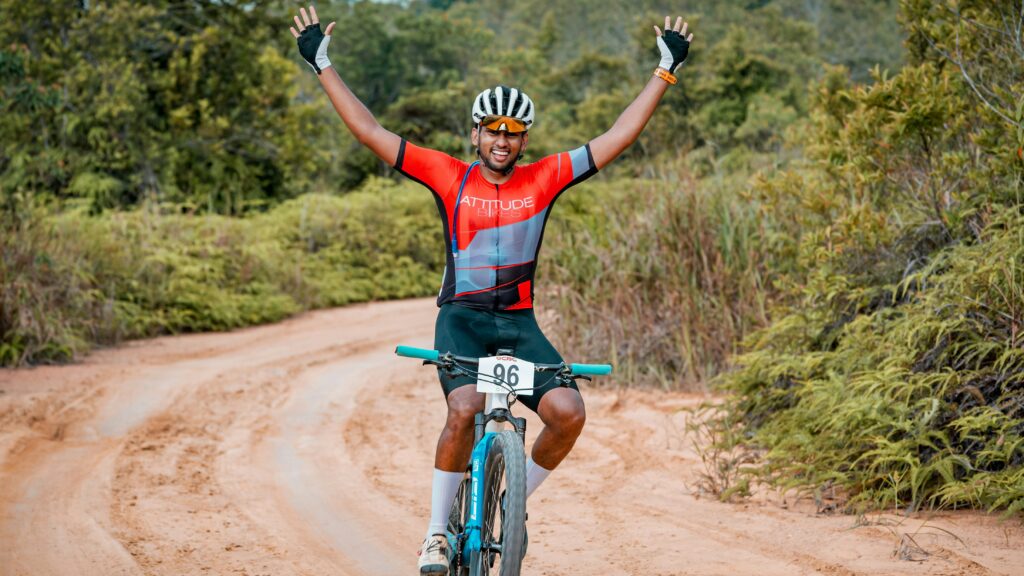Mindset Matters: The Link Between Confidence and Performance

Endurance athletes spend countless hours physically training for their sport. Even with enhanced skill sets, it is very common for athletes to struggle with feeling confident in their abilities.
Confidence is an athlete’s belief that they are prepared and can handle the demands of the race or training. For many, they can trust in their abilities and feel a sense of comfort and control. However, most endurance athletes know that endurance sports are full of unknowns and unexpected challenges —many that can compromise an athlete’s confidence levels.
Confidence is closely tied to an athlete’s perceptions of their ability to concentrate, set goals, exert effort, and feel good about themselves. A construct of self-confidence is self-efficacy, which is an athlete’s belief in their ability to accomplish the task at hand.
Many athletes struggle with confidence at some point during their training and racing, even when it comes to performance skills they have previously been successful with. When confidence is challenged, athletes might begin to doubt their abilities and experience heightened feelings of anxiety, worry, or nervousness. Confidence struggles can occur in athletes of all experience and skill levels.
The Relationship Between Confidence & Performance
Confidence and performance are related to each other. When an athlete feels confident, they are less likely to experience elevated levels of performance anxiety, which can help them perform at their optimal level. The opposite is also true. If an athlete is struggling with their confidence, they might notice elevated levels of performance anxiety, which can decrease their overall level of performance. Learning to recognize this association is a key component for success!
ADVERTISEMENT

How Endurance Athletes Can Build Confidence
There are numerous ways an athlete can work on becoming more confident in themselves and their abilities. Here are a few strategies to consider implementing:
-
Recognize the Small Wins
Many times, athletes are so focused on the outcome of what they’re trying to achieve that they overlook the small wins they have accomplished along the way. Recognizing these wins, no matter how small, can help an athlete feel competent in their abilities. Stacking these small wins can help an athlete recognize what they’re capable of achieving on race day.
-
Self-Talk is Critical
The inner dialogue of an athlete shapes how they view themselves. If they are full of self-doubt, they might notice struggles with their confidence and self-belief. Listening to how an athlete is talking to themselves is a critical component. Learning to replace negative self-talk with positive, motivational, or instructional self-talk can help them reshape these patterns and feel more confident in themselves.
-
Implement Mental Rehearsal
Visualization is a powerful mental skill. It helps athletes visualize themselves being successful in executing specific skills, such as race plans, etc. This technique allows the brain to develop muscle memory of these events. When the actual event occurs, the brain recognizes it as familiar, enabling the athlete to move forward with their plan of action. Incorporating visualization as part of an athlete’s mental skills program can help them feel more confident and prepared.
-
Develop Reset Routines
No matter how prepared an athlete may be, they may encounter an obstacle that throws them off track. When an athlete perceives that things are going wrong, their confidence might begin to waver. Creating a reset strategy that can be implemented immediately can help them regain control, center themselves, and feel confident. Some examples include breathing or utilizing a mantra.
-
Control the Controllables
Most athletes like to have control. Control provides a sense of comfort, which allows an athlete to feel more confident in that situation. Many elements of endurance sports are entirely outside an athlete’s control, such as the weather and the race course. Recognizing these elements is extremely important. Learning to focus on controlling the controllables can help an athlete feel more prepared. Identifying specific components that an athlete can control, such as nutrition, hydration, and gear choices, helps them feel prepared.
Confidence is connected to an athlete’s trust in themselves, including trusting their training, being able to adapt to situations, and being resilient under pressure. Learning to complement physical training with mental skill training can help athletes become more self-aware, learn how to regulate themselves in the moment, and implement strategies to support them during performance.
ADVERTISEMENT

JoAnne Bullard is a Doctor of Sport and Performance Psychology and a Certified Mental Performance Consultant through the Association for Applied Sport Psychology. She is also a Certified Strength and Conditioning Specialist through the National Strength and Conditioning Association.
She serves as a tenured Associate Professor at Rowan University and is the owner of Absolute Fitness, LLC. Her goal is to provide a holistically applied approach for clients through performance psychology consulting. She has experience working with athletes of all ages, including endurance athletes, in individual and group sessions. Her research areas include mindfulness, performance anxiety, goal setting, coping strategies, and mental well-being of athletes.
She has completed five marathons, numerous half-marathons, and is always looking for her next race.








